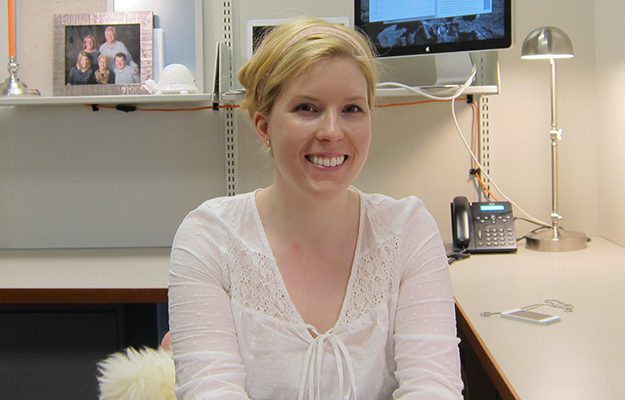Grace Lemmon, DePaul’s assistant professor of management and alumna, has studied how trends involving women in the business world have effected today’s workplace. Among these trends impacting the business worlds are: more women in the corporate ranks, multiple generations in the workforce and the bust- and-boom economic cycle.
Lemmon recently discussed what her studies revealed about today’s evolving workforce in a Q&A with Robin Florak from the DePaul’s Kellstadt Graduate School of Business. Here are a few excerts from that conversation:
Your research often focuses on psychological contracts in the workplace, or what employees believe they are owed, and, in return, owe their organizations. What has your research shown about how these contracts have changed in recent years?
Lemmon: “There are two trends that impact the modern psychological contract. One trend stems from the broader historical transition about what work means to the typical higher-skill, higher-wage employee, and the other trend is a product of the more recent economic cycle.”
“From a historical perspective, today’s psychological contract is far more short-term in nature. That is, both the employer and employee anticipate a relationship marked by short-term gain. For the employee, that gain is realized through acquiring new or novel on-the-job knowledge, education, skills and experiences—collectively known as human capital. Employees generally desire to soak up as much human capital as possible from their current employer in order to either leverage that capital into more favorable employment terms (e.g., bonus or promotion) or to find a better position elsewhere. Because organizations cannot provide all things to all employees, this choice leads to employees moving jobs far more often than in the past.”
“Notably—and perhaps counter-intuitively given that the general consensus that turnover is bad for business – the employer can benefit from the modern psychological contract, too. Employers that become adept at capitalizing on the multi-faceted human capital that an employee brings to his or her job are able to build a more nimble, intelligent workforce. There are, of course, limits to this benefit, largely centered on (a) finding a “sweet spot” of employment tenure that an employee needs to invest in order for both parties to realize gains, and (b) a contingency based on an employee’s ability to learn and apply new knowledge.”
There has been a lot of media coverage and debate about what some are calling the “opt-out” revolution among women professionals and how this contributes to the underrepresentation of women in top management. What does your research reveal about this issue?
“In short: it’s less of an ‘opt-out’ and more of a ‘push-out.’ At the same time, the effect is far less insidious than this contrast makes it seem.”
“What my research team has found is that managers – notably, both male and female managers – tend to assume that women have more family-work conflict than men. This assumption stems largely from the reality that women take on more household responsibilities than their male counterparts, and that because of this, are less capable of keeping family demands from affecting their work.”
“Because of this assumption, women are not offered high-visibility assignments and career encouragement, nor do their managers feel that they fit with the organization. Ultimately, this makes managers view women as less promotable. Moreover, because the manager is signaling to the women that they are less promotable, women can internalize this message, which can result in women, themselves, having weakened aspirations toward managerial positions. The frustrating conclusion to this research is that it is the perceptions – not abilities, not knowledge, not education – that are the catalyst for the ‘push-out.’”
What made you decide to teach at DePaul?
“I respect and appreciate DePaul’s admission strategy: to offer an opportunity to any prospective student who demonstrates an ability and eagerness to learn. While DePaul certainly has admissions standards, it doesn’t let a single piece of information solely determine who is admitted to the school. This results in a culture that celebrates the diversity of students, including an understanding of the breadth of knowledge and experiences that a student can offer the world at large, attention to personal student strengths and weaknesses, and a general acknowledgement that we can all bring something unique to the table.”
